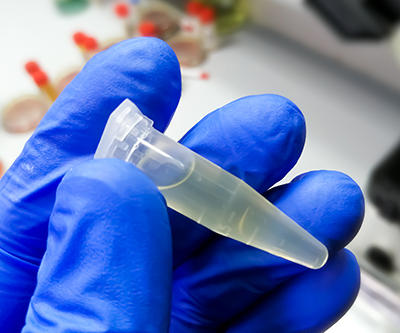
People with Niemann-Pick disease type C1 (NPC1), a rare neurodegenerative disorder of cholesterol metabolism, may experience movement issues, impaired swallowing and speech, intellectual decline, and death. The symptoms and their severity vary widely, as does the age of disease onset. Currently, there are no therapies for NPC1 approved by the Food and Drug Administration. Design and implementation of clinical trials evaluating potential treatments are complicated by the rarity and variability of the disease and by the relatively slow rate of neurological decline.
The Porter Research Group seeks to identify and characterize cerebrospinal fluid (CSF) biomarkers to facilitate clinical care for people with NPC1 and aid development of treatments. Biomarkers can help diagnose disease and indicate a patient’s prognosis. They also can be used to identify disease processes that could be targeted by therapies and to track responses to treatment.
Recently, the researchers identified multiple proteins with altered levels in the CSF of people with NPC1. They assessed levels of more than 1,400 proteins in CSF samples from 28 people with NPC1 and 30 people without the disease. Their analysis pinpointed several proteins previously reported to be higher in people with NPC1, as well as five proteins that had not yet been identified to be elevated in NPC1 CSF. These data provide a list of candidate biomarkers for further evaluation.
In a separate study, the researchers investigated whether levels of neurofilament light chain (NEFL), which is used as a biomarker for amyotrophic lateral sclerosis and is being evaluated for other neurodegenerative diseases, are altered in NPC1. They found that elevated NEFL levels in the CSF of people with NPC1 were linked to more severe disease. Among people treated with miglustat, a drug often used off-label for NPC1, NEFL levels in the CSF decreased over time. These findings suggest that NEFL may serve as a useful biomarker in future therapeutic trials. The researchers also are working to characterize blood levels of NEFL in people with NPC1.
Learn more about the Developmental Endocrinology, Metabolism, Genetics and Endocrine Oncology Group: https://www.nichd.nih.gov/about/org/dir/affinity-groups/DEMG-EO
 BACK TO TOP
BACK TO TOP